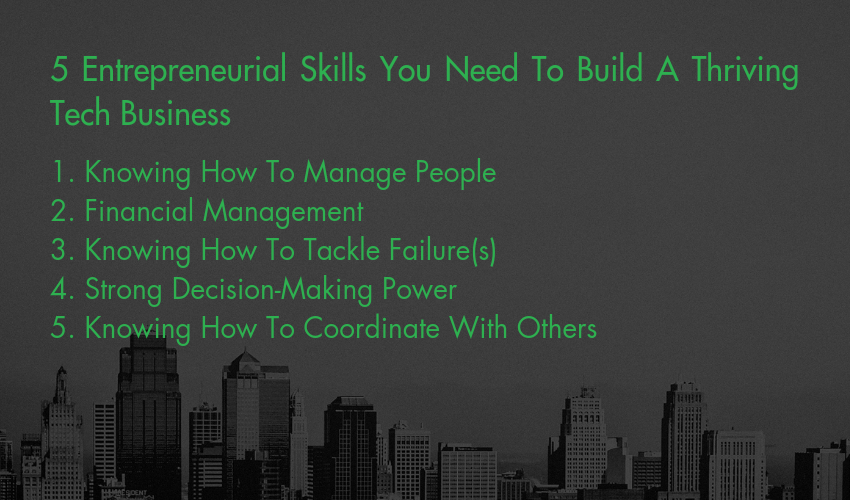In today’s highly competitive tech industry, building a successful tech business is largely attributed to having the right set of entrepreneurial skills.
It helps to get that extra edge that can potentially take your business from merely surviving to a thriving entity.
Entrepreneurs today are valued for their consistent innovation to outperform their competition.
From 1955 to 2016, only 12% of the Fortune 500 companies have maintained their place at the top.
The companies that dropped, unfortunately, couldn’t keep up with the creative pace that was fuelling the other successful businesses.
Walking the entrepreneurial path, one that is laden with concerns, doubts, and anxious thoughts, has never been easy for anyone.
A question most entrepreneurs often ask themselves is if they have the skills needed to build the business.
Although there isn’t a definitive model, certain characteristics are predominant among those who are successful.
This article puts light on few such entrepreneurial skills that, if you work on, can help you become a better leader.

5 Entrepreneurial Skills You Need To Build A Thriving Tech Business
1. Knowing How To Manage People
There are two essential components to this:
One that involves people and deals with encouragement, motivation, and leading.
The other involves management that deals with hiring, training, evaluation, and directing.
While the two components seem poles apart, a perfect marriage between them is an entrepreneurial skill that few leaders possess.
The key job of an entrepreneur is to draw out the best in people to achieve organizational goals.
One of the best ways to lead others is to lead yourself.
A good manager is aware of their internal rhythms and they align their actions with their goals, topped with the discipline required to weather the ups and downs of any audacious goal.
Picture this scenario for instance: Your star employee walks up to you and tells you they have received an offer from your rival firm.
They are leaning towards taking up that offer but wanted to chat with you first.
Your job here is to lead the situation to ensure the most effective outcome for yourself, your company, and your star employee. What do you do?
Ideally, you should be empathetic and understand the situation from your employee’s point of view.
Follow this with your own analysis of the situation and offer a midway path that benefits your organization whilst addressing your employee’s concerns.
2. Financial Management
When it comes to entrepreneurial skills, you will struggle to expand and scale your business if you are unable to manage your finances and budgets.
Learn how to manage your finances and if you still can’t, get someone to do it for you.
Ensure you have enough capital to bear the expenses and losses in the initial years before breaking even.
Once you start seeing profits, you need to plan where and how much of that money goes into your plans.
Depending on the nature of your business, you may want to branch out, invest in new technology, or expand your operations.
Know your priorities and have a plan on how you’re going to fund it. You can resort to fundraising and crowdfunding techniques to expand your business.
3. Knowing How To Tackle Failure(s)
According to the Small Business Association (SBA), 30% of new businesses fail during the first two years of being open, 50% during the first five years and 66% during the first 10.
The SBA goes on to state that only 25% make it to 15 years or more.
There is no entrepreneurial skill as strong as having thick skin and knowing how to tackle the speed bumps your business will face along the way.
Irrespective of how airtight everything is, an unexpected twist can shake even those with the strongest foundation.
It’s good to keep a contingency budget and be mentally prepared for the worst.
Your reaction to a possible failure will trickle down to your team and a calm response from your end will enable your business to better navigate the storm.
4. Strong Decision-Making Power
Judgment and decision-making are the perfect blends of complex problem-solving skills, emotional intelligence, critical thinking, people management, and coordination.
Here’s what decision making involves:
- Analyzing the situation
- Understanding its implications
- Reorganizing the scope and possibilities
- Come up with solutions and oversee the implementation
It’s a tough entrepreneurial skill to develop considering it requires great focus, willpower, and discipline.
Some of the best entrepreneurs do this daily. They spend time fire-proofing the business with possible problems that can come up later.
For example, Facebook missing the chance to proactively tackle the data privacy issue. Or Kodak completely ignoring the digital revolution.
Organizational leaders need to nurse these entrepreneurial skills to not only confront the present problems but to also be prepared for the upcoming storms.
5. Knowing How To Coordinate With Others
Managing people inherently comes down to power imbalances. Team leader and team member, manager, and employee.
Great leaders know how to operate on either side of the equation.
The person they are dealing with could be a fellow manager, their business partners, an investor, an important client, or any stakeholder who is playing a critical role in the business.
The objective is not to look at the world as a hierarchy but as one strong team.
Great entrepreneurs recognize when there are mutual dependencies, or when those dependencies are one-sided or situational.
For instance, an employee relies on their employer for income and the employer relies on the employee for output.
However, in the case of business partners, the situation is different as they are both looking for mutual benefits to their business model.
The crux of knowing how to coordinate with each other lies in understanding people and having the right tools to efficiently manage mutually dependent relationships.
Conclusion
While having a thorough knowledge of the industry that one is operating in is crucial, there’s a lot more than goes into making a successful entrepreneur.
Building a successful business takes a whole lot of entrepreneurial skills along with industry-expertise.
Each of these entrepreneurial skills can be trained over time and deployed but it requires self-confidence, dedication, and trust in others as well as self.
Most entrepreneurs and motivated professionals know the significance of investing in themselves by building valuable skills, working on their weaknesses, and improving their strengths over time.

